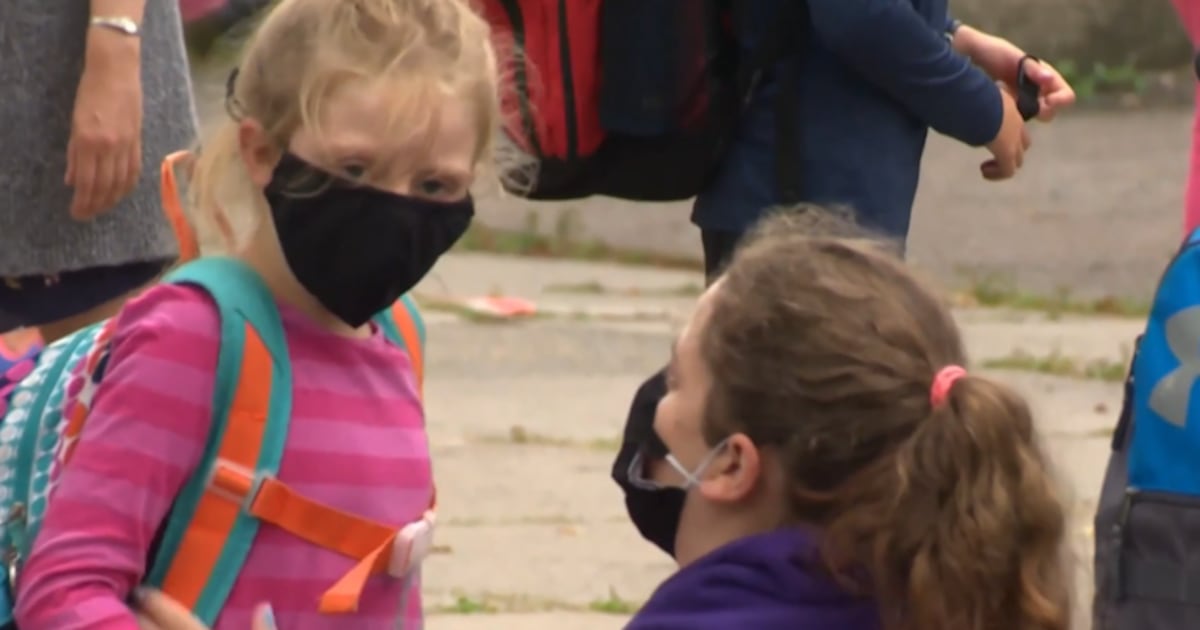Education
Kindergarten Bound: Children Born During Pandemic Start School

As the new school year approaches, a distinctive group of kindergarten students is set to enter classrooms across Saskatchewan. These children, born during the COVID-19 pandemic in 2020 and early 2021, present unique challenges and opportunities for educators. The transition from home to school may feel overwhelming for some, according to Stephan Bourassa, a pediatric mental health professional with over a decade of experience.
Bourassa, who runs Milestones Occupational Therapy for Children in Saskatoon, describes the situation as potentially “a big shock to the system” for many five-year-olds. He notes that while some families have managed to adapt well, others, particularly those already vulnerable to stress, have faced prolonged difficulties during the pandemic. “The families that would have done well have done well, and the families that were vulnerable to that stress have taken a little bit longer to recover,” Bourassa explained in an interview.
Unique Challenges in Early Education
Educators are gearing up to welcome these students, many of whom spent their formative years in isolation, wearing masks, and practicing social distancing. Bourassa asserts that overall, children have shown resilience after their initial experiences of adversity. “They’ve done well after the initial adverse experience, but there’s a wider, a very good variability of skills coming into kindergarten right now,” he said.
Saskatoon Public Schools is closely monitoring the incoming kindergarten cohort’s distinct characteristics. The missed opportunities for social interaction during early childhood mean that there will be a greater emphasis on play and peer engagement in the classroom. Strategies may include increased focus on free play, sharing, taking turns, and group games designed to foster interpersonal skills. Educators will also adjust the curriculum pacing to better align with individual student needs while keeping a close eye on their well-being.
In response to inquiries about preparations for these students, Greater Saskatoon Catholic Schools indicated that they are not anticipating any unusual challenges in their kindergarten classrooms this year.
Parental Involvement is Key
Bourassa emphasizes the crucial role parents play in helping their children adjust to school. “Children can also be vulnerable, so they can be malleable, either positively or negatively,” he stated. He encourages parents who might have concerns about their child’s readiness for school to take proactive steps. “Go knock on the door of the school. Say, hi, we just want to take a look around. Can I see the kindergarten classroom? Even a two-minute little preview will help that child immensely,” he advised.
While challenges exist for these “COVID babies,” there are also advantages. Bourassa points out that many of these students are already familiar with digital communication tools like FaceTime, which could facilitate their social interactions in the classroom.
As the school year begins, teachers and parents alike are preparing to support this unique generation of learners. With thoughtful adjustments in teaching strategies and a focus on community support, there is hope that these children will thrive in their new environment.
-

 Science2 months ago
Science2 months agoToyoake City Proposes Daily Two-Hour Smartphone Use Limit
-

 Health2 months ago
Health2 months agoB.C. Review Reveals Urgent Need for Rare-Disease Drug Reforms
-

 Top Stories2 months ago
Top Stories2 months agoPedestrian Fatally Injured in Esquimalt Collision on August 14
-

 Technology2 months ago
Technology2 months agoDark Adventure Game “Bye Sweet Carole” Set for October Release
-

 World2 months ago
World2 months agoJimmy Lai’s Defense Challenges Charges Under National Security Law
-

 Technology2 months ago
Technology2 months agoKonami Revives Iconic Metal Gear Solid Delta Ahead of Release
-

 Technology2 months ago
Technology2 months agoSnapmaker U1 Color 3D Printer Redefines Speed and Sustainability
-

 Technology2 months ago
Technology2 months agoAION Folding Knife: Redefining EDC Design with Premium Materials
-

 Technology2 months ago
Technology2 months agoSolve Today’s Wordle Challenge: Hints and Answer for August 19
-

 Business2 months ago
Business2 months agoGordon Murray Automotive Unveils S1 LM and Le Mans GTR at Monterey
-

 Lifestyle2 months ago
Lifestyle2 months agoVictoria’s Pop-Up Shop Shines Light on B.C.’s Wolf Cull
-

 Technology2 months ago
Technology2 months agoApple Expands Self-Service Repair Program to Canada









